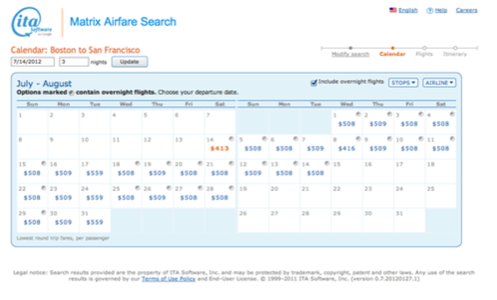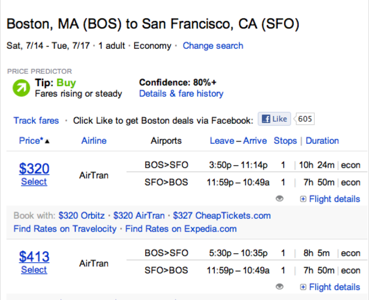My girlfriend and I are renting an apartment in Paris for a week this summer, which is the first real vacation I have taken since 2006, when I went to Dublin to run a marathon then spend a week recovering in Irish pubs and on Irish seashores. (Word of advice: no matter how enchanting it seems, don’t rent a bicycle on the rocky Aran Islands off the coast of Galway two days after running your first marathon).

The only thing that is further in the past than my last, “real” week-long vacation was the first time I turned to Orbitz as my first and last shopping destination when booking air travel for business and the weekend getaways. According to Orbitz, the first trip I ever booked through the site was in November, 2001 when I flew from Pittsburgh to Philadelphia.
That says a lot about how good Orbitz has been at maintaining my loyalty, but not so much about my savvy shopping skills. With a pair of $1,200+ flights to purchase (based on originall search of Orbitz), I decided it was time to figure out a better way to buy airfare online.
The strategy outlined below takes a few extra steps, and there are certainly similar Web sites you can turn to instead of the ones I recommend. But what amounted to less than 15 minutes of extra Web sleuthing ended up saving us more than $500 on the two flights we purchased.
Figure Out When You Want To Travel
One of the reasons for my Orbitz rut is that my travel has been largely for work and holidays. Searching multiple sites when I had specific travel dates meant there wasn’t going to be much more than a couple of bucks in price variations from one site to the next.
Planning a vacation, however, meant I have some flexibility in dates. So I turned to the Matrix Airfare Search offered by ITA Software, a unit of Google. By plugging in a single date, I can see the lowest airfares for that date and the following 30 days. Within a few minutes we were able to figure out the cheapest time for our trip involved a mid-June departure.

Buy Now Or Wait?
Another reason why I liked Orbitz is that if someone booked the same flight on the site for less than I had paid, they would send me a check. It’s a nice little price guarantee but it doesn’t protect me from price fluctuations on other sites, and it doesn’t help me figure out whether or not prices are going to go down between now and my trip.
Enter Bing’s travel search engine, which tried to predict whether or not flight prices will go up or down. Once we had settled on our travel dates for Paris, we searched for the same flights in Bing and tried to figure out if we should book now or later.
While the price for our Paris search held relatively steady when compared to our initial search on Matrix, note the difference in the sample itinerary I’m using for this article:

Another nice feature about Bing is that it opened the same search in Hotwire, Travelocity, Expeida and Priceline so we could instantly comparison shop.
Track Prices
In both case, the time to buy was when we searched. But had Bing told us to wait, we could have used Yapta to track the price of our flight and even gotten text message alerts sent to our mobile phone when prices dropped.
If we wanted to bid on Priceline to see if we could shave some money off the price of the flight, the Bidding For Travel forum, as well as the Priceline and Hotwire forums on Better Bidding, are good resources for picking up pointers.
Click “Purchase Now”
As it stands, we were ready to purchase. The best possible price on a flight we could get was on Aer Lingus with a stopover in Dublin. We did one last search of the air carrier’s Web site (which is often the cheapest place to look). Out of loyalty, and because I am such a big fan of getting checks in the mail, I did one last search on Orbitz.
Ultimately, Expedia had the best price. With just a little extra time we were got the price down to $904 meaning we saved close to $600 on what we would have paid for two flights on our initial search.
Photo courtesy of ShutterStock.

















